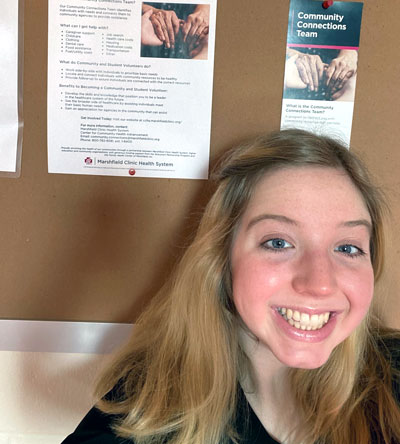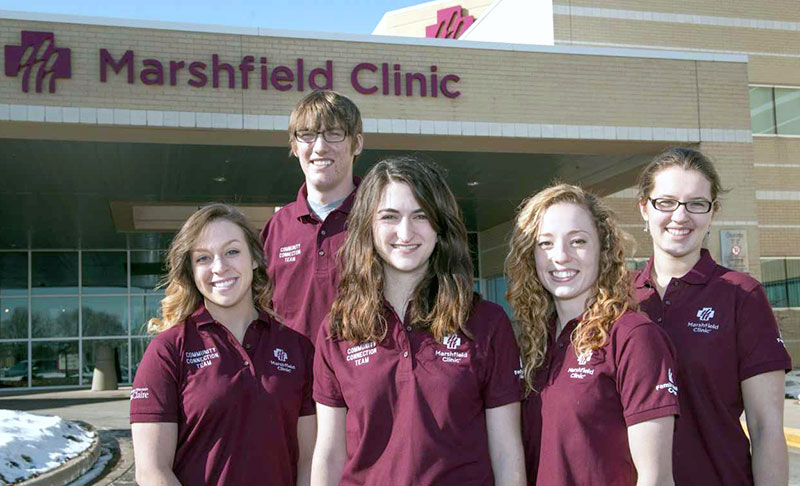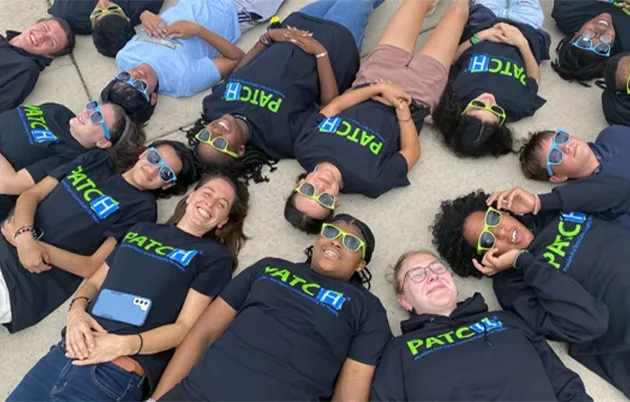Connecting Clinics, Campuses and Communities to Improve Health
From an office in Hibbard Hall on the UW-Eau Claire campus, neuroscience major Samantha Thompson works the phones, looking for resources across central and northern Wisconsin that can help keep people healthy.

During her shift, she may help Marshfield Clinic Health System patients find low-cost dental care, get help paying utility bills or set up transportation to medical appointments.
“This has really opened my heart and my mind to the problems that patients face,’’ said Thompson, a senior who will be applying to medical school. “As a physician, I will have an intersectional understanding of what people face in addition to their health issues. It’s hard to take care of your health if you don’t have food and you can’t afford your medications.”
Since 2018, Marshfield Clinic Health System has operated a Community Connections Team (CCT), thanks to a $1 million grant from the Wisconsin Partnership Program.
Marshfield health providers screen patients at clinic visits for social needs such as food, housing, transportation and other factors affecting health. If a need is identified, providers send a referral to CCT students on the campuses of UW-Stevens Point and UW-Eau Claire.
Since it began, the program has screened 53,700 patients and referred 7,600 who indicated that they needed help with any of 12 metrics known as social determinants of health. The CCT calls resulted in 17,000 referrals to agencies such as food banks, WIC (Women, Infant, Children) programs, dental clinics and other community organizations. Some patients identified other needs during their conversations with CCT volunteers.
It’s hard to take care of your health if you don’t have food and you can’t afford your medications.
- Samantha Thompson
Marshfield Clinic Health System (MCHS) serves Wisconsin and Michigan’s Upper Peninsula, stretching from Marquette, MI, in the north and Wittenberg on the east, to Cumberland and Beaver Dam on the west and south. The system has 1,600 providers comprising 170 specialties, and also has a health plan and research and education programs.
Darcy Vanden Elzen, MPH, director of Community Health for Marshfield Clinic Health System, said the program has helped providers identify patient needs and given them a team that can provide assistance to patients. Social determinants of health (SDOH) are nonmedical factors like socioeconomic status, education, physical environment, employment, social support networks, access to health care, which account for 80 percent of a person’s overall health outcomes. Addressing social determinants of health is important for improving health, quality of life and reducing disparities.
“We hear from our providers that they like the program,’’ she said. “Providers don’t always have the time or the knowledge of community resources.”

Vanden Elzen said the program has trained about 140 student volunteers, who work alongside AmeriCorps volunteers who mentor the students and act as resources. The social work staff of Marshfield Clinic Health System is also available to assist. Students go through about a month of training before they begin to call patients, and are supported during their service.
The program started in 2018, with UW-Eau Claire students volunteering in the pediatrics department at MCHS-Eau Claire. Dr. Julie Anderson, professor of biology and director of the health education programs at UW-Eau Claire, was a founding member of the project.
“Once the COVID pandemic hit, we couldn’t have students in the clinic, so we talked to the folks at Stevens Point and switched to the phone model,’’ Anderson said. When the student volunteers come in for a shift, they’ll find a list of patients, and their preferred days and times for phone calls. After the initial interview, students follow up a week or two later to see if the patients connected with the services they needed.
Jen Paape, CCT program coordinator for MCHS, agreed that the shift to virtual outreach was beneficial because it reduced transportation barriers for students and allowed those without cars on campus to volunteer.
Paape said the students are trained about how to communicate effectively and help patients decide what kind of assistance they think is most important.
“Often, more referrals would come up during the phone conversation,’’ Paape said. “Someone might have initially been interested in the WIC program, but then it would turn out they also needed baby clothing, and dental care for the older children. Once they understand the program, additional needs may be discussed. They will share that they are actually interested in other resources and programs.”
Paape said students come from a variety of backgrounds, ranging from education and social work to health science and biology.
Patients’ comments indicate appreciation for the help.
“I have received a lot of help from the Community Connections Team. I would not have known about the resources without them.”
“Without the Community Connections Team volunteers and their determination to connect metro community agencies, it would be incredibly difficult for me to find transportation to get to my medical appointments,’’ one wrote. “I probably wouldn’t get there at all.”
Another said, “ “At least once a week somebody called me and let me know that, again, I wasn’t alone…somebody cared.”
Certainly the program has been a success for the students who participated over the years. At the end of their participation, CCT students are assessed on their health literacy, personal perspectives on health equity and the impact social determinants have on overall health. About 88 percent strongly agreed or agreed that the work that they did while volunteering for CCT was impactful to the community; 66 percent strongly agreed or agreed that their experience with CCT influenced their current career path and 100 percent were more knowledgeable on community resources and the effects that social determinants have on overall health.
Joey Krasovich, a first-year student in the Doctor of Physical Therapy program at UW-Stevens Point, said the CCT experience was a perfect complement to his classroom work.
“It’s great that in the classroom we’re already talking about the social determinants of health and about how you’re treating the whole person and not just the bum knee,” he said. “This helps us get some practical experience in those areas.”
Krasovich said that being over the phone, rather than in person “took us out of our comfort zone because we’re not in the same room with the person.” He said it helped him hone communication skills that will be critically important for his clinical work.
He said no two shifts at CCT are the same.
“Every single person’s story is a little different,’’ he said. “Even if someone is in a similar situation, they may view their most needed items as something different. It’s very impactful to help them reach their goals.”
Krasovich, who is from Milwaukee, said he also gained a new appreciation for the health challenges in rural areas. “In urban areas, there is public transportation and things may be within walking distance,’’ he said. “How do you help a farmer who is 30 miles away from the help he needs?”
Krasovich hopes to work with patients who have neurodegenerative diseases and said his CCT experience was invaluable. “Anyone who works in health care should have an experience like this,’’ he said.
Dr. Corey Huck, of the UW-Stevens Point School of Health Sciences and Wellness said that exit interviews he does with CCT students indicate that listening to personal narratives of patients facing real-life challenges and hardships “fostered a stronger, more authentic concept of empathy toward patients and community members.” He also saw heightened awareness of community resources and greater confidence with promoting them.
“Volunteering with the CCT program provides an enriching experience which will strengthen the quality of care for many students entering into a variety of health professions,’’ Huck said.
Anderson, of the UW-Eau Claire faculty, said she sees the changes in CCT students when reading their personal statements about why they want to attend medical, dental, nursing or physician assistant schools.
“They realize being a PA or a dentist is much more than diagnostics and prescribing medication,’’ she said. “There is a lot more understanding of the human story, the humanity of the patients. Until you understand that, it’s hard to have positive outcomes. It opened their eyes to what health care and medicine really is.”
She also hears a lot of anecdotes from students who did not fully grasp the needs of the communities where they grew up.
“One student realized he was talking to a person that lived right down the street,’’ Anderson said. “These aren’t ‘others,’ they’re your neighbors. They live in your neighborhood and they’re struggling.”
The CCT program has been instrumental in developing a framework to address social determinants and health equity and will continue once the WPP grant ends at the end of 2023.
“We know we need to embed equity into the fabric of our organization and how we care for patients,” Vanden Elzen said. “Technology is a critical component to address SDOH, especially in rural communities. We will be utilizing a SDOH software platform that allows care teams to assess patients and members for SDOH needs, make appropriate referrals to community-based organizations (CBOs) and close the loop. The platform also provides a community-facing portal for anyone to search for resources.”
Huck, of UW Stevens Point, said that in addition to using software systems, “it would be beneficial for traditional clinical care providers to execute a “warm handoff” or immediate referral to a health and wellness coach who can help patients get connected with community resources and empower them to take action.”
Thompson, the UW-Eau Claire student, is serving on the project steering committee and said she is happy the CCT project will live on.
“A lot of patients have been very thankful, we’ve helped a lot of people,’’ she said. “It’s really interesting to see the plans for the future.”
By Susan Lampert Smith

